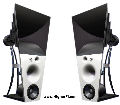 |
 Before mastering, better mixing !... Before mastering, better mixing !... |
SafeandSound 
Cool Tourist
  
Registration Date: 19-10-2009
Posts: 32
 |
|
Hi all I noticed how many threads there are on loudness and it is a hot topic and has been for a while.
However, I suggest overall mix quality will be improved if you step back and think of balance and EQ first.
When mixing I find I work best with the following methodology :
1)Do a rough mix if not done (you probably done this during production/writing stages, I used to)
2)Then mix for real, ironing out little problems here and there all the way through your production.
3)Leave at least 24 hours before listening again and iron out any final little problems in the automation and balance.
4)Try if possible to see how the mix translates to other systems, car, small stereo, ipod etc.
If you mix through bus compression, bypass it occasionally to get a perspective, is it helping drums punch through the mix, is it detrimental to the low end? Is it adding overall power?
And if there really is no budget for mastering and you mix through a limiter do the same and take care not to over do it, rarely does a limiter on it's own generate loudness without big audible side effects (like bad compression, pumping, pulling the ambience and muddiness up)
During the process be aware of tonal balance through the spectrum, is there too little or too much bass compared with some D n B refs you have? Are your hi hats bright enough and do the snares have enough bite and attack?
Hope this is informative.
cheers
__
masteringmastering.co.uk
This post has been edited 2 time(s), it was last edited by SafeandSound: 20-10-2009 15:11.
|
|
|
20-10-2009 15:07 |
|
|
Gregg 
Wicked Producer
  

Registration Date: 16-05-2007
Posts: 417
Helpfulness rating:
 |
|
Yeah, definitively some good tips here.
Not sure if this is general knowledge but I noticed that during the process of eq-ing each channel, it’s very important how your changes don’t just sound on their own but also in the whole mix.
So it is not only about muting all tracks and eq one after another, always check how the entire elements incorporate with each other after your manipulations/changes and how the overall mix is affected. This way you get aware of potential issues in the mix quicker and they can also be eliminated directly at their source.
If you can’t get an instrument the way it should sit in the mix eq wise, just eq it while listening to the whole mix. Or eq separately and then make some minor changes when all stuff is playing together.
|
|
|
20-10-2009 19:39 |

|
|
Phalanx 
Chronologic


Registration Date: 13-09-2007
Posts: 333
Helpfulness rating:
 |
|
| quote: |
Originally posted by Gregg
Yeah, definitively some good tips here.
Not sure if this is general knowledge but I noticed that during the process of eq-ing each channel, it’s very important how your changes don’t just sound on their own but also in the whole mix.
So it is not only about muting all tracks and eq one after another, always check how the entire elements incorporate with each other after your manipulations/changes and how the overall mix is affected. This way you get aware of potential issues in the mix quicker and they can also be eliminated directly at their source.
If you can’t get an instrument the way it should sit in the mix eq wise, just eq it while listening to the whole mix. Or eq separately and then make some minor changes when all stuff is playing together. |
This is some great advice. I used to EQ all of my parts individually and though it sounded clean, the mix was very empty. Now, I like to get my breaks first, sub and mid bass, and any other elements EQ to sit around the main ones. You end up using a lot of frequencies you would not have expected, but the mix really fills out. Also, when using a chain of effects like distortion, I like to continually re EQ the element to keep it's shape.
__
http://soundcloud.com/chronologic
|
|
|
20-10-2009 20:10 |

|
|
BattleDrone 
2161... the future.
    

Registration Date: 30-12-2005
Posts: 6,413
Helpfulness rating:
 |
|
Good stuff in there mate.
It's often a hard job and it's a bumpy road to improvement but if you keep at it.
__
 Check my soundcloud (exclusive tracks on there) Check my soundcloud (exclusive tracks on there)
|
|
|
20-10-2009 21:36 |

|
|
Pure_bordem
Tourist
 

Registration Date: 27-11-2009
Posts: 36
Helpfulness rating:
 |
|
Another thing to keep in mind is unless your bouncing to 32 bit float your master volume can't go above digital 0 or the bounce will distort, this is why we put a limiter at -0.1 because thats as close as we can get with CD quality.
That being said, remember all perceived loudness is relative. Another thing, compression COMPRESSES sound, it doesn't make it louder, it pushes down louder frequencies to be more even with lower level frequencies and then we raise the volume on the whole thing. Everything is relative to that what is around it.
__
FL Studio, get it here for 10% off
|
|
|
10-12-2009 23:42 |
|
|
Age Break 
Filth is my second name
  

Registration Date: 30-11-2009
Posts: 465
Helpfulness rating:
 |
|
|
|
15-02-2010 00:04 |
|
|
SafeandSound 
Cool Tourist
  
Registration Date: 19-10-2009
Posts: 32
 |
|
No problems, all the best producing.
__
masteringmastering.co.uk
|
|
|
27-03-2010 22:43 |
|
|
|
|
